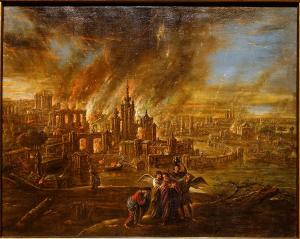
It is a strange thing to see that many try to use Jesus’ words about the poor, that they shall always be with us, as an excuse to do nothing for them. They say, because they will always be with us, we should ignore them and be concerned about other things, like culture war initiatives. They seem to think he was speaking of the futility of helping the poor, which, however, is far from what he said. Rather, Jesus suggested they would always be with us, so that, we should always be concerned about them and do what we can for them. We should, that is, develop our sense of compassion so that when we see them, we will do what we can for their benefit: “For you always have the poor with you, and whenever you will, you can do good to them” (Mk. 14:7a RSV).
When we see someone we love being in need, we will share with them their grief, their pain and sorrow, and as a result, we will do what we can to help them out of that need because we love them. Since Christians are called to love not just friends and family, but everyone, they are expected to treat everyone with the same love and compassion they would for someone in their family. Just as they will not ignore the plight of someone they feel extremely close to, but help them, so they should feel the need to help all those who are experiencing hardships, such as those dealing with extreme poverty. They certainly should not try to find excuses to justify doing nothing. Thus, Christians should have more than a mere desire for the well-being of others, but they should be actively involved in helping them get better. Sometimes, we can do enough by ourselves, but often, the problem is beyond what we can do as the problem is structural and systematic. Until the system itself is fixed, the problem will remain.
Obviously, we can’t create utopia. We can’t fix every problem. However, that doesn’t mean we should not strive for it. We should always seek after the greater good, doing what we can to help bring it about. When dealing with problems associated with poverty, this will include actions both on the personal level, such as giving food or money to someone who is starving, but also, on a community and systematic level, where we try to improve the conditions of society so that fewer and fewer people find themselves in such need. It is important to realize how much the social structure, and the sins embedded in that social structure, creates the conditions which lead to such pain and sorrow. It is sin, more than anything else, which has created the problem, and such sin is mostly communal or social in nature. This is why must never simply put the blame for someone suffering from poverty on themselves since many people, indeed, most who are poor are poor for reasons beyond their personal control. Again, it is important for us to recognize that it is sin, more than anything else, which creates the problem; it is sin which leads to countless people suffering hunger, poverty, and it is not just any sin, but systematic sin and the structures it creates in society. But, as sin causes so many to suffer, sin also helps others become unseemly rich and powerful. Upon attaining such status, they engage the systematic structures of sin, seeking to reinforce them, so that they can enjoy the unjust advantage those structures have given them. This, in part, is one of the messages of Abba Moses in The Conferences:
The things that you refer to as works of piety and mercy are necessary in this age, as long as iniquity continues to dominate. Their practice would not be called for even here were there not an overwhelming number of poor, needy, and sick people, which is the result of the wickedness of men who have seized for their own use – but not used – those things that were bestowed upon all by the Creator of all. As long as such iniquity is rampant in this world, then, this behavior will be necessary and beneficial to the one who practices it, crowning a good disposition and a pious will with the reward of an eternal legacy. But this will cease in the world to come, where equity will rule and when there will no longer exist the inequity that made these things obligatory. Then everyone will pass over from this multiform or practical activity to the contemplation of divine things in perpetual purity of heart. [1]
Abba Moses makes it clear that we have to confront sin, and with it, the systematic structures of sin. We must do so until the end of time. Jesus said, the poor will always be with us. That means, we will always have someone who needs our help. We will always have to be working to reform ourselves and society, doing all we can to make things better, indeed, trying to make things the best we can. What we must not do is make excuses to ignore our responsibilities.
The world and all that is in it is meant to be enjoyed by all. As long as the universal distribution of goods is subverted by society, helping some get more out of the goods meant to be shared by all, the more such a society falls into sin. That is, the more it shows itself to be wicked. If its wickedness is not stopped, it will eventually face judgment, that is, the consequences which come about for its wickedness. Systematic structures of sin ultimately do as all sin does, which is destroy, and the society which is built upon them will collapse in upon itself. Is that, after all, not the true lesson of Sodom and Gomorrah? They were societies based upon selfishness and greed. They took what they wanted from the rest of the world, using and abusing all things for their every pleasure. But that kind of society could not and would not last. It was destroyed from within before it reached its final fate. This is why it is important not only to look at people and help them on a personal level, but to understand the root causes of the problems in the world, the way that sin interferes with the just distribution of goods. For then we shall recognize that working to fix things, to become more equitable, is actually a way to fight against sin and its grasp upon the world. This also means that those who stand against such social action, against social justice, stand for and promote sin.
Therefore, as Christians live in the world, they take a part of its history. They are expected to follow the example of Christ. They are to try to do what they can to make things better, to help those suffering from the effects of sin. The poor, the needy, shall always be with us because the systematic structures of sin, with sin itself, will only be fully overcome when the world and all that is in it finds itself drawn over to eternity and the eternal kingdom of God. Then, there shall be no more poor, no more needy, as all will be in pursuit of what is good and true, loving each other, sharing with each other the good which they have been given instead of trying to hold it back and kept to themselves alone.
[1] John Cassian, The Conferences. Trans. Boniface Ramsey, OP (New York: Newman Press, 1997), 49 [First Conference;; Abba Moses].
Stay in touch! Like A Little Bit of Nothing on Facebook.
If you liked what you read, please consider sharing it with your friends and family!
N.B.: While I read comments to moderate them, I rarely respond to them. If I don’t respond to your comment directly, don’t assume I am unthankful for it. I appreciate it. But I want readers to feel free to ask questions, and hopefully, dialogue with each other. I have shared what I wanted to say, though some responses will get a brief reply by me, or, if I find it interesting and something I can engage fully, as the foundation for another post. I have had many posts inspired or improved upon thanks to my readers.













